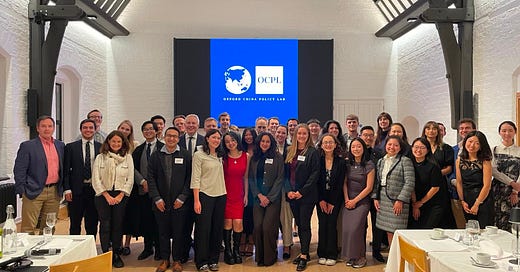Dear friends and colleagues,
Last week, we hosted our annual closed-door conference, “Navigating Emerging Technologies, Geopolitics, and Risk”. We welcomed over 50 participants from government, academia, and industry to explore the UK’s evolving role amid intensifying US-China competition in artificial intelligence.
Our program included keynote speeches, expert panels, and fireside chats covering a wide range of pressing issues: from China’s evolving technology and industrial strategies, to the complex geopolitics of AI nationalism and sovereignty, to the systemic risks posed by rapid innovation in a multipolar world. At the heart of our discussions were two central questions: How can we navigate technological rivalry while preserving room for strategic engagement on key issues? And how do we manage the risks of rapid innovation without stifling progress? The day underscored just how fast this landscape is changing – and how essential it is to create spaces where diverse perspectives can gather, challenge assumptions, and confront difficult questions together.
What stood out to me the most was the quality of conversations that emerged when you put China specialists in the same room as AI researchers, when you have former diplomats talking with current policymakers, when academic rigor meets real-world urgency. These aren't just networking opportunities – they're essential to breaking down the silos that too often limit our collective ability to understand these challenges.
Coming from a background in academic publishing, where book timelines stretch across years, I've had to adjust to a world where AI capabilities evolve monthly and geopolitical dynamics shift weekly. That acceleration only reinforces the importance of convenings like ours. How do we maintain analytical clarity when the pace of change seems relentless? The common thread throughout our panels was the need for sustained engagement that embraces complexity, rather than retreating into oversimplified narratives.
This year’s conference reminds us why OCPL exists: to provide space for the rigorous, cross-cutting analysis these challenges demand and to ensure these insights reach the people and institutions best positioned to act.
Warm regards,
Nadine Staes-Polet
Programme Associate
News and Views
The research and analysis of OCPL experts are their own and do not reflect organisational views
Scott Singer co-authored an article for the Foundation for American Innovation outlining the fragile nature of U.S. AI leadership and the urgent need for a coordinated, global “full-stack diffusion” strategy to maintain American competitiveness amid rising Chinese AI advances and export control challenges.
OCPL Fellow Bosco Hung wrote an article for Tech Policy Press analysing the fragmented AI safety landscape and advocating for more focused, specialised dialogues to improve governance.
Scott Singer contributed to a forum in Stanford’s DigiChina, analysing Xi Jinping’s Politburo study session on AI and China’s strategy to accelerate domestic AI adoption and pursue technological self-sufficiency amid rising geopolitical pressures.
Sam Hogg spoke to POLITICO about the UK-US economic deal’s focus on addressing China-related trade and security issues, highlighting cooperation on investment security, export controls, and technology supply chains.
On May 9, Kayla Blomquist hosted Charlotte Smart from the UK Foreign, Commonwealth and Development Office at the Oxford Internet Institute. Charlotte, who leads the UK’s science and innovation diplomacy in China, shared insights on DeepSeek and the evolving role of diplomacy in technology.
On May 22, OCPL hosted a Q&A session for our fellows with experts Robert Daly, Paul Triolo, and Karman Lucero on the evolving dynamics of U.S.-China technology and economic competition. The conversation covered the impact of geopolitical tensions on global tech, the challenges faced by countries navigating between the two powers, and the future of international tech governance. The event concluded with drinks and informal networking, providing a great opportunity for further discussion and connection.
What We’re Reading
“Was Made in China 2025 Successful?” by Camille Boullenois, Malcolm Black, and Daniel H. Rosen. This Rhodium Group report argues that China’s Made in China 2025 strategy has delivered significant industrial gains, particularly in electric vehicles, robotics, and clean tech, while falling short in areas like advanced semiconductors and high-end machinery. It contends that China has reduced import dependence and fostered global competitiveness in targeted sectors, but at the cost of growing inefficiencies, overcapacity, and fiscal strain. The report suggests these trade-offs could challenge the sustainability of China’s industrial policy model.
“Open or Closed? China’s Dilemmas in a Changing Geopolitical and Geoeconomic Order” by Rana Mitter. This paper argues that China faces a strategic tension between the need for economic openness to stimulate growth and a push for societal closure driven by security concerns. It highlights structural constraints, from demographic decline and rural-urban divides to BRI-related debt, and situates China’s caution in historical narratives of foreign intervention. Despite these challenges, the article suggests regional economic engagement may offer viable paths forward, so long as geopolitical flashpoints like Taiwan are avoided.
“Third-party compliance reviews for frontier AI safety frameworks” by Aidan Homewood et al. This paper explores how third-party compliance reviews could strengthen adherence to AI safety frameworks. It outlines the potential benefits such as improving internal oversight and stakeholder trust, alongside challenges including cost, information security, and reputational risks. The authors assess practical implementation questions and propose a tiered model of review, ranging from minimalist to comprehensive approaches. The paper argues that thoughtful design of third-party reviews could help operationalise safety commitments in the frontier AI sector.
“Decoding China’s Industrial Policies” by Hanming Fang, Ming Li & Guangli Lu. This working paper uses large language models to analyse over 3 million Chinese government documents from 2000 to 2022, extracting detailed information on industrial policy objectives, tools, and implementation across different government levels and regions. The analysis highlights how China’s industrial policies are shaped by economic and political factors, influence firm behaviour in areas such as entry and productivity, and vary across industries and development phases. It also examines policy persistence, regional diffusion, and identifies downsides like spatial inefficiencies and industry overcapacity.



